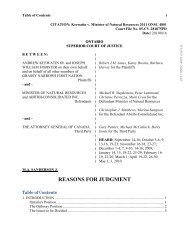2012 BCSC 1090 Northern Minerals Investment Corp. v. Mundoro ...
2012 BCSC 1090 Northern Minerals Investment Corp. v. Mundoro ...
2012 BCSC 1090 Northern Minerals Investment Corp. v. Mundoro ...
- No tags were found...
Create successful ePaper yourself
Turn your PDF publications into a flip-book with our unique Google optimized e-Paper software.
<strong>2012</strong> <strong>BCSC</strong> <strong>1090</strong> <strong>Northern</strong> <strong>Minerals</strong> <strong>Investment</strong> <strong>Corp</strong>. v. <strong>Mundoro</strong> Capital Inc.<br />
cancel a special meeting called on requisition of the shareholders. This cannot have<br />
been intended by Parliament. Reading s. 102 of the C.B.C.A. in conjunction with s. 143<br />
arguably means that the directors' residual powers under s. 102 would not extend to<br />
the unilateral cancellation of any meeting properly convened on the shareholders'<br />
request. At the very least, any exercise of the powers of the directors in these<br />
circumstances would be subject to close scrutiny by the courts." (pp. 178, 179)<br />
22 The above quote poses two possibilities available to a court in the circumstances of this case.<br />
I believe that the latter possibility is the preferable one. It conforms most closely with the general<br />
philosophy underlying the CBCA and does not unduly restrict the directors' ability to conduct the<br />
corporation's business in its best interests. It allows the directors to postpone a shareholders' meeting<br />
as part of their power to manage the business of the corporation and to act in the best interests of all<br />
their shareholders. However, it also protects the shareholders' right to call a special meeting since it<br />
subjects the directors' action to the close scrutiny of a court and will provide relief where the action<br />
was taken for an improper purpose or in bad faith.<br />
23 It is also the most reasonable approach. As the Alberta Court of Appeal stated in Jorex at p.<br />
178, "An interpretation of the directors' powers giving rise to any absurd or unintended results must<br />
be rejected." To adopt the interpretation urged by the applicant would mean that even if the purpose<br />
of the meeting became irrelevant, e.g. the applicant sold all its shares before June 26th, or a flood<br />
prevented the vast majority of the shareholders from attending the meeting, that meeting would still<br />
have to be held, opened and then adjourned to another date. Surely this does not accord with<br />
common sense. If two statutory interpretations are possible, the court should adopt the interpretation<br />
that would not lead to absurd results. [QL]<br />
[26] While the Jorex and Oppenheimer cases dealt with the Canada Business <strong>Corp</strong>orations Act I am<br />
satisfied that the more modern approach reflected is also applicable to the British Columbia Act. I agree that<br />
the Paringa approach is, as noted by Steel J. in Oppenheimer, “an unduly restrictive approach to director’s<br />
powers, a restrictive approach which could lead to unreasonable results” (para. 20). The provisions of the<br />
articles and the Act and the residual “basket clause” in the articles and the Act are to be read as was done in<br />
Jorex and Oppenheimer. As a matter of contractual interpretation the directors’ powers flow from the Act and<br />
articles in which the directors are in fact granted residual powers.<br />
[27] The petitioner next asserts there was no proper purpose in postponing the meeting and that such a<br />
purpose must not be prejudicial to shareholders. (Oppenheimer).<br />
[28] They rely on Ewart v. Higson-Smith (2009), 61 B.L.R. (4th) 228 (Ont. S.C.J.), where Cumming J.<br />
described postponing a shareholders’ meeting as an “unusual step” which was only warranted in “special<br />
circumstances.”<br />
[29] In the petitioner’s view the primary purpose of the postponement was to permit <strong>Mundoro</strong> to “attempt to<br />
make the Advance Notice Policy enforceable.” As the petitioner notes the notice of the AGM did not include<br />
a reference to a resolution to approve such a policy. As a result such approval could not be sought at the<br />
AGM. They also allege that the purpose of the postponement is to allow the directors time to solicit more<br />
proxies, this latter assertion based on <strong>Mundoro</strong> having retained a proxy agent for a proxy fight at the AGM.<br />
[30] The petitioner submits that concerns of management that their slate of directors might not be<br />
nominated are not special circumstances.<br />
http://www.courts.gov.bc.ca/jdb-txt/SC/12/10/<strong>2012</strong><strong>BCSC</strong><strong>1090</strong>.htm[10/22/<strong>2012</strong> 1:37:45 PM]
















